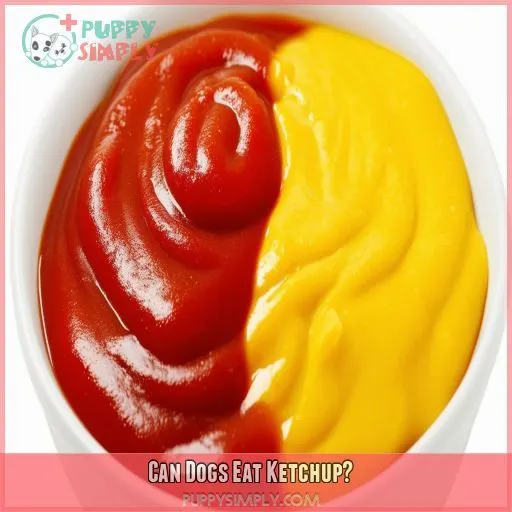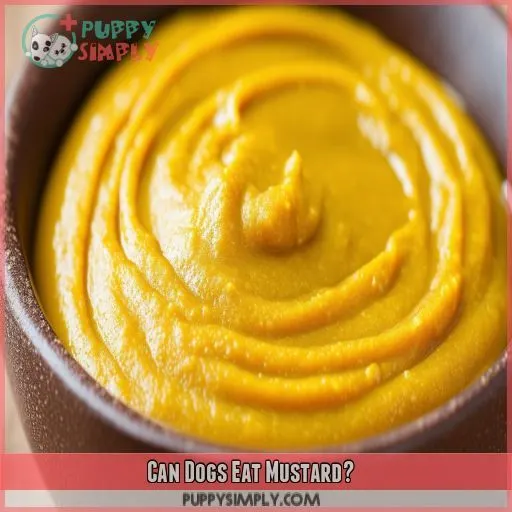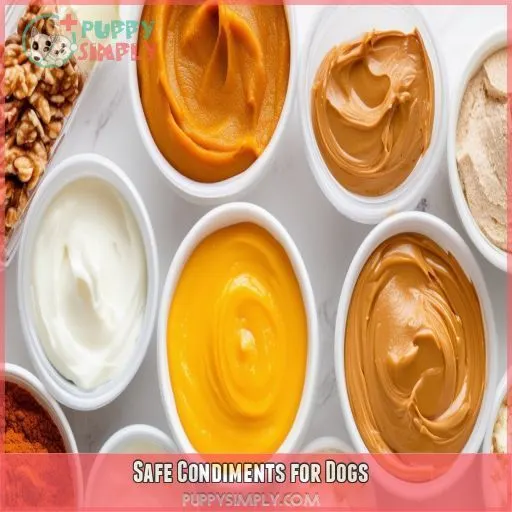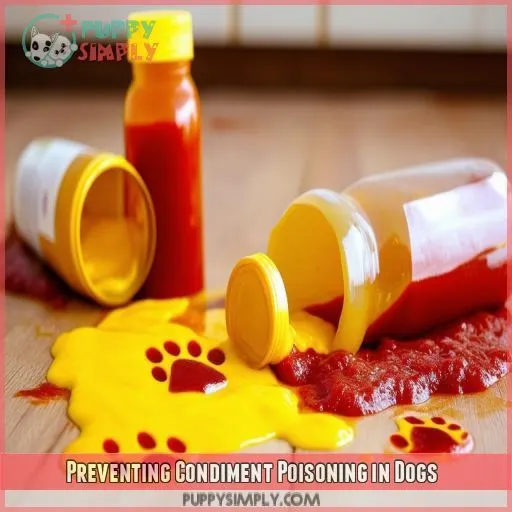This site is supported by our readers. We may earn a commission, at no cost to you, if you purchase through links.
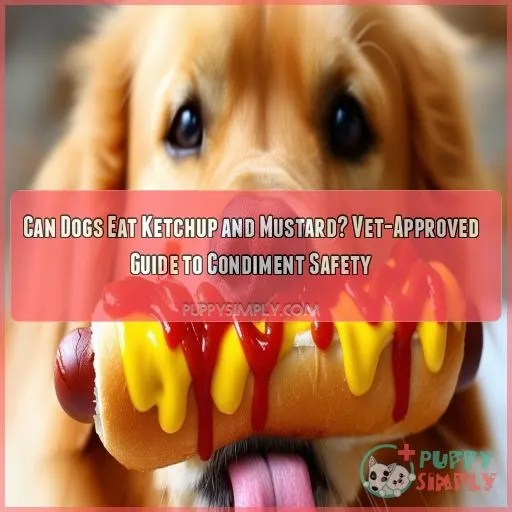
From potential dangers associated with the consumption of ketchup and mustard in dogs to toxic ingredients that one needs to be very cautious about, we’ll look at alternatives to keep Fido safe in this vet-approved guide.
Take your four-legged friend into the realm of condiment safety
Table Of Contents
- Key Takeaways
- Can Dogs Eat Ketchup and Mustard?
- Can Dogs Eat Ketchup?
- Can Dogs Eat Mustard?
- Other Toxic Condiments for Dogs
- Safe Condiments for Dogs
- Preventing Condiment Poisoning in Dogs
- Frequently Asked Questions (FAQs)
- What happens if my dog eats ketchup?
- What happens if my dog eats mustard?
- Is ketchup or mustard bad for dogs?
- What condiments are ok for dogs?
- Can dogs eat ketchup or mustard?
- Can a person with epilepsy eat mustard?
- Can dogs eat ketchup?
- Can dogs eat garlic ketchup?
- How much ketchup is toxic for a dog?
- Can dogs have ketchup-flavored treats or chips?
- Is homemade mustard safer for dogs than store-bought?
- Are there any health benefits of ketchup for dogs?
- Can pregnant dogs be more sensitive to ketchup or mustard?
- Conclusion
Key Takeaways
- Keep your furry friend safe! Ketchup and mustard are like kryptonite for dogs. Steer clear of these condiments to avoid a world of wagging-tail woes.
- Watch out for sneaky ingredients! Ketchup and mustard might seem harmless, but they’re hiding toxic villains like onion powder, garlic powder, and too much salt. These ingredients can lead to tummy troubles, dehydration, and even worse health issues.
- Treat your pup to paw-some alternatives! Instead of ketchup and mustard, offer your furry friend safe options like plain cooked meats, unsalted veggies, and small amounts of plain yogurt or pumpkin.
- Remember, prevention is paw-tection! Keep condiments out of your dog’s reach, and don’t feed them cooked food with condiments. It’s the best way to keep your furry friend happy, healthy, and wagging their tail for years to come
Can Dogs Eat Ketchup and Mustard?
Dogs shouldn’t eat regular ketchup and mustard. Ketchup often contains onion and garlic powder, which are toxic to dogs, and excessive salt can also pose a risk. Mustard seeds can cause severe gastroenteritis and damage red blood cells. Symptoms of condiment poisoning in dogs include anemia, dehydration, pale gums, and lethargy.
However, plain mustard without onions or garlic, and ketchup without harmful ingredients, can be safer options in moderation. Always be cautious and keep condiments out of your dog’s reach.
Want to know more about safe condiments for your dog and how to prevent accidental poisoning? Keep going!
Can Dogs Eat Ketchup?
Ketchup contains several ingredients that can be toxic to dogs, including onion powder, garlic powder, and excessive salt. These components can lead to various health issues in dogs, such as anemia, dehydration, and gastrointestinal problems
Ingredients in Ketchup Toxic to Dogs
You might think ketchup’s just tomatoes, but it’s got some sneaky ingredients that can harm your furry friend. Watch out for high salt and sugar content, preservatives, and those pesky garlic and onion powders.
While ripe tomatoes are safe, ketchup’s packed with sweeteners and additives. Long-term effects? Not pretty.
Potential Health Issues From Ketchup Consumption
Ketchup toxicity in dogs can lead to serious health issues.
The high sugar content may contribute to obesity and diabetes, while preservatives can trigger allergic reactions.
Onion and garlic powder, common in ketchup, are toxic to dogs and can cause gastroenteritis. Even small amounts can be harmful, especially for smaller breeds.
It’s best to keep this condiment off your pup’s menu to avoid potential complications
Symptoms of Ketchup Poisoning in Dogs
If your furry friend sneaks some ketchup, watch out for these red flags: vomiting, diarrhea, and a sudden loss of appetite.
Dehydration risks increase, so keep an eye on their water intake. Long-term effects can include heart disease, especially if garlic’s involved. In severe cases, you might spot reddish urine
Can Dogs Eat Mustard?
Mustard is highly toxic to dogs due to compounds in mustard seeds that can cause severe gastroenteritis. All types of mustard, including homemade, wild, English, Dijon, honey, yellow, and mustard powder, are harmful to your canine companion and should be strictly avoided
Toxicity of Mustard Seeds
Well, you may think that a bit of mustard won’t hurt your furry friend; however, this is a misconception. Mustard seeds simply are too much when talking about canine health. Some of the ingredients inside those tiny rascals really can mess up your dog’s digestion.
What You Need to Know About the Toxicity of Mustard Seeds:
- It causes severe gastroenteritis.
- Damages red blood cells
- Pale gums and lethargy
Don’t fall for that sad puppy expression—mustard is a no-go for Fido!
Types of Mustard Harmful to Dogs
You might think a little mustard on your dog’s treat is harmless, but think again! All types of mustard – from English to Dijon, yellow to honey – are off-limits for your furry friend.
The culprit? Mustard seed toxicity. Smaller pups are especially susceptible, so don’t let their puppy eyes fool you.
While dogs can eat honey in moderation, mustard’s a no-go. Stick to safe, dog-friendly foods instead
Signs of Mustard Poisoning in Dogs
As with ketchup, mustard can be a sneaky culprit for your furry friend’s health. If your dog’s gotten into the mustard jar, keep an eye out for these telltale signs of mustard poisoning:
- Loss of appetite and excessive drooling
- Vomiting and diarrhea (often with a mustard-like odor)
- Abdominal pain and lethargy
Don’t wait for symptoms to worsen. If you suspect mustard poisoning, contact your vet immediately for proper guidance and pet safety measures
Other Toxic Condiments for Dogs
While ketchup and mustard are concerning, many other condiments pose risks to your dog’s health. You’ll need to be cautious of ingredients like onions, garlic, xylitol, and high levels of salt or fat found in various sauces and dressings
Onions and Garlic in Condiments
You’ll want to watch out for onions and garlic in condiments, as they’re toxic to your furry friend. These ingredients, often found in ketchup and other sauces, can cause serious health issues in dogs.
Even small amounts can lead to anemia and damage red blood cells.
It’s best to steer clear of any condiments containing these flavorful but dangerous additives. Your pup’s health is worth more than a tasty topping!
Xylitol in Condiments
You might’ve heard about xylitol, the sneaky sweetener that’s a real party pooper for pups. It’s lurking in some condiments, ready to crash your dog’s system faster than you can say "sit."
Even a tiny lick can spell trouble, especially for smaller dogs. Watch out for symptoms like vomiting or lethargy.
The risks? Liver failure and even death.
High Salt and Fat Content in Condiments
You might think a little extra salt or fat won’t hurt your furry friend, but condiments can pack a punch. High sodium content in many condiments can lead to dehydration and even salt poisoning in dogs. The excessive fat? It’s a recipe for pancreatitis and weight gain. Here’s what you need to know:
- Sodium overload can cause excessive thirst and urination
- Fat-rich condiments may trigger painful pancreatitis
- Regular consumption can lead to obesity and heart issues
- Even small amounts can disrupt your dog’s balanced diet
Safe Condiments for Dogs
While most condiments are unsafe for dogs, there are a few exceptions you can offer in moderation. Plain mustard without onions or garlic, ketchup free from onions, garlic, and xylitol, and low-sodium soy sauce can be given occasionally in small amounts
Plain Mustard Without Onions or Garlic
While most condiments are taboo, you might wonder about plain mustard for your furry friend. Good news! Plain mustard is entirely safe in small portions if it doesn’t have onions and garlic added to its ingredients.
However, the ingredients must be checked since some companies try to sneak in harmful additives.
Make homemade mustard for your pooch in case you’re feeling adventurous, and make sure it’s completely free from any dog food safety concerns
Ketchup Without Onions, Garlic, or Xylitol
While most commercial ketchups are off-limits, you can find dog-friendly alternatives. Look for ketchup without onions, garlic, or xylitol – these are the main culprits.
Better yet, whip up a homemade version using ripe tomatoes and dog-safe ingredients
Low-sodium Soy Sauce in Moderation
While plain ketchup can be risky, you might wonder about soy sauce. Good news! Low-sodium soy sauce, in moderation, is generally safe for dogs.
But don’t go overboard – too much salt can still lead to weight issues and dehydration. Keep an eye on your pup’s sodium intake and opt for low-sodium options when possible
Preventing Condiment Poisoning in Dogs
To prevent condiment poisoning in dogs, keep all condiments securely stored out of your pet’s reach. Avoid feeding your dog any cooked food that contains condiments, as even small amounts can be harmful to their health
Keeping Condiments Out of Reach
Now that you know which condiments are safer for your furry friend, let’s talk about keeping them out of paw’s reach. Safe storage is key to pet safety.
Store condiments in high cabinets or use childproof locks. Train your pup to stay away from the kitchen when you’re cooking.
Consider making homemade, dog-friendly condiments as alternative treats
Avoiding Feeding Cooked Food With Condiments
Yes, keeping condiments inaccessible is quite essential, but so is being watchful of what’s on the plate. Don’t give in to those puppy eyes!
Tossing your furry friend cooked food with condiments can be a ticket to a world of trouble. From allergies to obesity, pancreatitis to choking, and even dehydration—the risks just aren’t worth it.
Stick to dog-safe treats instead, and you’ll be wagging tails together in no time
Frequently Asked Questions (FAQs)
What happens if my dog eats ketchup?
If your dog eats ketchup, they might experience digestive issues like vomiting or diarrhea. Watch for signs of dehydration and lethargy. Large amounts can be harmful due to high salt, sugar, and potential toxic ingredients. Monitor closely and call your vet if concerned
What happens if my dog eats mustard?
Mustard’s a no-go for Fido – it’s a recipe for ruff times. The spicy condiment can upset your pup’s tummy, causing vomiting and diarrhea. Steer clear to keep your canine companion happy and healthy
Is ketchup or mustard bad for dogs?
Yes, ketchup and mustard are both bad for dogs. Ketchup has harmful ingredients like onions, garlic, and excess salt. Mustard contains toxic compounds. Both can cause vomiting, diarrhea, and other serious health issues. Avoid giving them to dogs
What condiments are ok for dogs?
Dogs should avoid condiments like ketchup and mustard due to potentially harmful ingredients such as onions, garlic, and xylitol. Safe options include plain cooked meats, unsalted vegetables, and small amounts of plain yogurt or pumpkin
Can dogs eat ketchup or mustard?
As far as feeding your dog, avoid ketchup and mustard at all costs. Many condiments contain onions and garlic, much salt—hazardous things to dogs’ health.
Can a person with epilepsy eat mustard?
Yes, you can eat mustard if you have epilepsy. However, it’s important to review the ingredient list, as some additives may vary. Always consult with your healthcare provider for personalized dietary advice
Can dogs eat ketchup?
No, dogs shouldn’t eat ketchup. It contains harmful ingredients like salt, onion, and garlic powder. These can lead to serious health issues such as high blood pressure, heart disease, vomiting, and diarrhea. Keep it out of reach
Can dogs eat garlic ketchup?
Did you know that over 60% of ketchup brands contain garlic powder? Dogs shouldn’t eat garlic ketchup. It’s toxic and can lead to severe health issues such as vomiting, diarrhea, and even seizures. Always avoid it
How much ketchup is toxic for a dog?
Even small amounts of ketchup can be harmful to dogs due to its high salt content and toxic ingredients like onion and garlic powder. If your dog consumes any, monitor for symptoms and consult a veterinarian
Can dogs have ketchup-flavored treats or chips?
Why risk it? Dogs shouldn’t have ketchup-flavored treats or chips. They often contain harmful ingredients like onion and garlic powder. Even small amounts can pose health risks, so it’s best to avoid them altogether
Is homemade mustard safer for dogs than store-bought?
Homemade mustard isn’t safer for dogs than store-bought. Mustard seeds contain toxic compounds that cause gastroenteritis. All types of mustard are harmful to dogs, so it’s best to avoid feeding them any mustard altogether
Are there any health benefits of ketchup for dogs?
What’s the point of feeding your dog ketchup? There are no health benefits in ketchup for dogs, and its harmful ingredients outweigh any potential positives. Keep your furry friend safe by avoiding ketchup entirely
Can pregnant dogs be more sensitive to ketchup or mustard?
Yes, pregnant dogs can be more sensitive to ketchup or mustard because of the changes happening in their body and a higher risk of dehydration or other complications. Keep away from feeding such condiments for perfect health and safety.
Conclusion
An ounce of prevention is worth a pound of cure. Therefore, knowing the risks associated with condiments as a responsible pet owner is very important.
Particularly, when looking at "Can dogs eat ketchup and mustard?", recall that most components used in these condiments are dangerous for your dog’s consumption. Only go for safe options, and always keep unhealthy condiments out of your furry friend’s reach for perfect health and well-being to be guaranteed.

